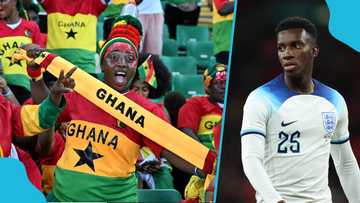Ranking the 11 Ghanaian-Born Footballers Who Chose European Nations
- World champions and global stars like Marcel Desailly and Jerome Boateng all had the option to play for Ghana but chose other nations
- Several Ghanaian-born players helped their adopted countries win major international tournaments, including the FIFA World Cup and UEFA Euro
- Personal identity, cultural upbringing, and professional opportunities played major roles in why many players snubbed the Black Stars
Ghana’s top stories, now easier to find. Discover our new search feature!
Ghana has long been blessed with a rich pool of football talent. Over the years, several gifted players have proudly donned the Black Stars jersey in international tournaments, qualifiers, and friendlies.
However, the national team could have been even stronger had certain high-profile players of Ghanaian heritage opted to represent their ancestral home instead of other countries.

Source: Getty Images
While notable stars like Inaki Williams, Kevin-Prince Boateng, Adam Larsen Kwarasey, Kwesi Appiah, and others eventually pledged their international allegiance to Ghana, a number of foreign-born footballers turned down the chance to wear the Black Stars jersey.
YEN.com.gh takes a look at top nine players of Ghanaian descent who chose to represent other nations instead.
Nigel Quashie (England → Scotland)
Born in London to a Ghanaian father and English mother, Quashie started his international journey with England's U21s and the England 'B' team.
Despite early connections with England, he switched allegiance to Scotland, making history as just the second black player to represent the Tartan Army. He earned his first cap in 2004 and went on to become a regular in the squad.
Marcel Desailly (France)
One of the most accomplished defenders of his generation, Desailly was born in Ghana but never considered playing for the Black Stars.
He identified wholly with France and helped Les Bleus to win both the 1998 FIFA World Cup and Euro 2000. In his autobiography, he reiterated his deep connection to France, further distancing himself from ever representing Ghana.
Gerald Asamoah (Germany)
Asamoah emigrated from Ghana to Germany as a teenager and made his debut for the German national team in 2001, becoming the first African-born player to represent Germany.
He played in two World Cups (2002 and 2006) and was widely admired for his work ethic and commitment.
Mario Balotelli (Italy)
In 2007, Balotelli declined an invitation from Ghana’s national team coach Claude Le Roy. He chose to hold out for Italy, and eventually became a household name for the Azzurri, scoring 13 goals in 33 appearances.
His decision marked a significant loss for Ghana, especially considering his early promise.
Danny Welbeck (England)
Welbeck, whose full name is Daniel Nii Tackie Mensah Welbeck, was born in Manchester to Ghanaian parents.
Ironically, he made his senior England debut against Ghana in 2011, drawing boos from Ghanaian fans at Wembley. Despite his heritage, he remained committed to England, scoring 12 goals in 31 appearances.
Jerome Boateng (Germany)
Born to a Ghanaian father, Jerome and his half-brother Kevin-Prince Boateng took very different paths—Kevin chose Ghana, while Jerome stuck with Germany.
The decision paid off, as Jerome played a crucial role in Germany's 2014 World Cup win. He now stands as one of the finest defenders of his generation.
Alexander Tettey (Norway)
Tettey was born in Accra but moved to Norway as a child. After rising through the ranks at Rosenborg, he made his senior debut for Norway in 2007 and became a mainstay in their midfield.
His connection to Ghana was overshadowed by his Norwegian development.
George Boateng (Netherlands)
Though born in Ghana, George Boateng grew up in the Netherlands and went on to represent Oranje at international level, earning four caps.
Known for his combative style, Boateng spent much of his club career in the English Premier League and later moved into coaching.
David Odonkor (Germany)
Another player with Ghanaian roots who chose Germany, Odonkor made a name for himself during the 2006 World Cup, providing a key assist in the group stage.
Although Ghana pursued him, he opted for Germany and was later included in the squad for Euro 2008.
Karim Bellarabi (Ghana/Morocco – Germany)
Karim Bellarabi, born to a German mother and a Moroccan father, also has a Ghanaian stepfather, which made him eligible to represent the Black Stars.
In 2014, the Ghana Football Association publicly expressed interest in bringing him into the national team setup ahead of the 2015 Africa Cup of Nations.
“It’s true, Karim is on our list, and we would love to have him in the national team — if possible, for the African Nations Cup in January 2015,” GFA spokesperson Ibrahim Sannie was quoted as saying by Bild.
However, Bellarabi chose to represent Germany instead. He made his senior debut for Die Mannschaft on October 11, 2014, in a UEFA Euro 2016 qualifier against Poland, playing the full match. He went on to score his first international goal in Germany’s 7–0 win over Gibraltar in June 2015.
Memphis Depay (Netherlands)

Source: Getty Images
Born to a Ghanaian father and Dutch mother, Depay has become one of the Netherlands’ top attacking players, per Goal.
Despite his Ghanaian background, he chose to represent the Dutch national team, debuting in 2013 and playing in major tournaments.
His personal rift with his father also influenced his decision, and he uses only his first name on shirts to reject his father’s surname.
Hudson-Odoi reacts after decisive goal vs City
YEN.com.gh also reported that Callum Hudson-Odoi took to social media to channel his emotions after scoring the decisive goal as Nottingham Forest stunned Manchester City.
His response after delivering the match-winning strike was a mix of passion and quiet confidence.
Source: YEN.com.gh






